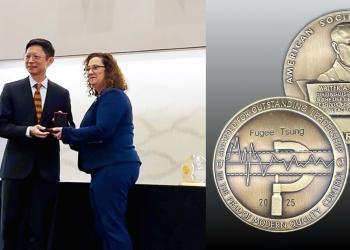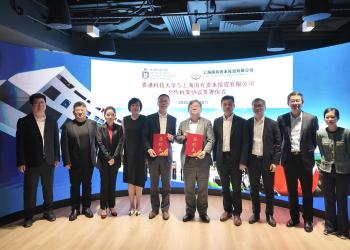HKUST Achieves Breakthrough in Dynamic Radio Spectrum Access - Optimum Spectrum Usage Facilitates Development of Telecom Industry
Prof Qian Zhang of the Computer Science and Engineering Department of the Hong Kong University of Science and Technology (HKUST) and her research team have achieved breakthroughs in the development of “cognitive radio” and dynamic radio spectrum access.
With the rapid growth in the radio communication business, the demand for radio spectrums by 3G, WiFi and Internet of Things is increasing by the day. The shortage of spectrum resource has become an acute problem facing the world today.
Currently, most countries in the world are using a control and demand system to manage the usage of radio spectrum. However, the vast majority of licensed users do not use their spectrum all the time, and this leads to wastage. Hence the hot global issue at present is how to enhance the utilization of radio spectrums so that some users can have access to idle spectrums in different localities and during different periods.
Prof Zhang pointed out that “cognitive radio” technology can flexibly and effectively manage dynamic spectrum resources and enhance spectrum utilization. It is an intelligent radio technology that can be used to search for idle spectrum, with excellent cognitive and anticipatory capability to make judgment on how to reasonably allocate spectrum to satisfy demand.
Prof Zhang and her team have completed an unprecedented survey and analysis of the comprehensive usage of spectrums in China, and proposed for the first time a method to optimize the usage of spectrum by primary users and secondary users. Prof Zhang coordinated and managed the mode of spectrum entry between the primary users (who are licensed) and the secondary users (who are not licensed), so that the primary users can seek support from secondary users to meet their business needs within a shorter period, freeing up more spectrum resource to secondary users, thus achieving a win-win scenario.
Prof Zhang used the analogy of traffic control where radio spectrums are the highway and the spectrum users are the vehicles. “Highways usually have several lanes, but if some lanes are restricted for special use, there may be traffic congestion during peak hours. When the number of vehicles increases radically, we not only need more traffic lanes, but we also need an effective method to manage traffic,” she said.
Prof Zhang also pioneered the design of a market model for wireless service operators to take part in double-tier spectrum auctioning. As this model can effectively boost the income of wireless service operators, it will therefore also boost the market potentials of cognitive radio and dynamic spectrum access technology.
Prof Zhang said, “Cognitive radio technology and dynamic spectrum resource management have great significance to the future development of radio networks. Not only will it generate active discussion in academia, but it will also have extensive industrial application. The next challenge for me and my team will be to convert our basic research into marketable products.”
For media enquiries, please feel free to contact :
Ross Lai
Tel: 2358 6306 / 9103 2928
Email: rosslai@ust.hk
Donna Wong
Tel: 2358 6317
Email: donnaw@ust.hk









